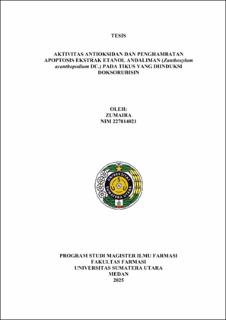Aktivitas Antioksidan dan Penghambatan Apoptosis Ekstrak Etanol Andaliman (Zanthoxylum acanthopodium DC.) pada Tikus yang Diinduksi Doksorubisin
Cardioprotective Effect of Hydroalcohol Extract of Andaliman Fruits (Zanthoxylum acanthopodium DC.) through Apoptosis Pathway on Doxorubicin-Induced Rats

Date
2025Author
Zumaira, Zumaira
Advisor(s)
Dalimunthe, Aminah
Salim, Emil
Metadata
Show full item recordAbstract
Doxorubicin is a widely used anticancer drug known for its cardiotoxic side effects, which can induce apoptosis and damage heart tissue. Extract of andaliman fruits (Zanthoxylum acanthopodium DC.) (EAF) has demonstrated antioxidant properties and is believed to offer cardioprotective effects by inhibiting apoptosis. The aim of this study was to activate the antioxidant activity and inhibition of EAF apoptosis in doxorubicin-induced rats. The research method was experimental using rats divided into seven groups: a normal group, a doxorubicin group (10 mg/kg BW), a quercetin group (50 mg/kg BW), and four EAF treatment groups (50, 100, 200, 400 mg/kg BW) receiving different treatments of doxorubicin and EAF over nine days. On days 8 and 9, rats were administered doxorubicin, and serum and heart tissue were collected for analysis. Results showed that EAF significantly reduced the levels of iNOS, cTnT, TNF-α, and caspase-3, while increasing eNOS expression in the heart tissue of doxorubicin-treated rats. The 400 mg/kg BW dose of EAF was most effective, showing results comparable to the quercetin group. Histopathological examination also revealed that EAF helped repair myocardial damage caused by doxorubicin. In conclusion, EAF possesses significant cardioprotective activity, preventing apoptosis through a reduction in key biomarkers of heart damage and promoting tissue repair in doxorubicin-induced myocardial injury. This suggests that EAF could be a promising adjunctive therapy to mitigate the cardiotoxic effects of doxorubicin.
Collections
- Magister Theses [372]
